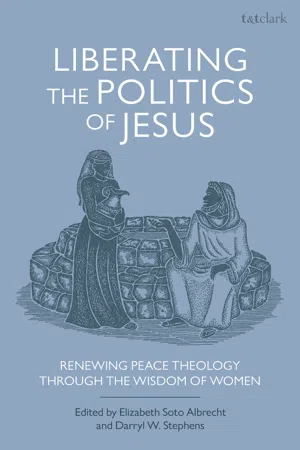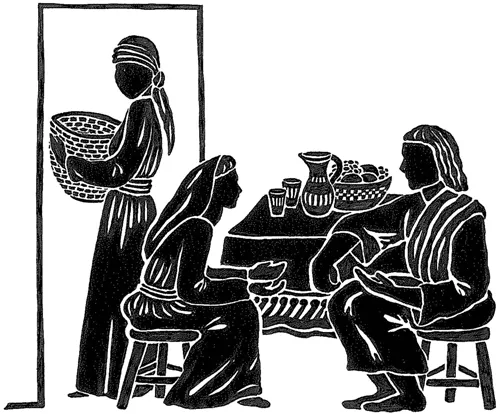![]()
PART ONE
Retrieval, Remembering, and Re-envisioning
![]()
1
The Retrieval of a Liberating Christology
Nancy E. Bedford
The question I want to address is how Christology can push against the cooptation of the figure of Jesus by a racist culture. My approach is that of an Anabaptist Latina feminist systematic theologian working within the tradition of the hermeneutical spiral of deconstruction and retrieval. My working presupposition is that the gospel of Jesus is indeed good news, first and foremost for the vulnerable and ultimately for all creation. When the Christian faith functions in ways that justify violent and lethal practices, the calling of the theologian in the community of faith—and beyond—is to point out what has become off-kilter and needs to be reexamined and changed. I argue that Christology must be liberated from the normative whiteness, the lethal forms of masculinity, and the docetic epistemologies that often lurk even in well-intentioned tropes about the “politics of Jesus.”1 Put positively, in order truly to be liberating in a North American context, the “politics of Jesus” needs to decenter whiteness, reorient masculinity, and celebrate a holistic understanding of life.
Context and Culture
I write as a documented, educated, employed, white-passing Latina living in the United States. I have access to social capital and to the “benefit of the doubt” in many situations because of my Anglo-Saxon last name, my pale skin, and the cadences of my spoken English. I am coded as a “straight white lady,” a “wife,” a “mom,” and—as I move toward the end of my fifties—increasingly as a “grandmotherly” figure. Any peculiarities I might manifest fit quite tidily and, ultimately, non-threateningly into a “professorial” typology that allows for a certain degree of eccentricity. In tension with this white-passing privilege is the fact that as a Latina I do not fully live in accordance with the assumptions and logic of normative whiteness in the United States; I’m not sure I could if I tried, as I was not born or formed in this country. My opinions and my choices may often be quite discordant with what is generally expected of me on the basis of how I look and sound. This can cause a ripple of cognitive dissonance that is all-too-soon dissolved back into the miasma of normative whiteness, which overrides any initial discomfort with what I say or do. It is not simple as a white or white-passing person consistently to subvert the logic of whiteness because whiteness trumps almost everything else in dominant US culture, including religious affiliation.
By “whiteness” I mean a system both symbolic and material that works in implicit and explicit ways to privilege persons coded as “white”—people who look and sound like me. It is entrenched in hegemonic common sense—in the “default setting”—about how society works, meaning that, particularly to those of us benefited by it, it can be all but invisible.2 Those of us who are white or white-passing might imagine that racism is a personal attitude that we can choose simply to reject or even that racism is largely a problem of the past that only a recalcitrant minority continues to perpetuate. However, whiteness is not only or even primarily about individual prejudices or biases, nor is it a problem of the past. Rather, it is an enduring structural phenomenon. In the United States it is undergirded by legal, social, and economic “feedback loops” that lock in the accumulation of wealth and power by the descendants of white, Anglo-Saxon colonizers and those who can pass for such.3 Historical amnesia about the racist principles on which this country was built up is a central component of whiteness. Whiteness also traverses the logic of what is perceived as educated speech, norms for interaction and body language in the workplace, and appropriate topics of conversation.4
As a theologian, when I speak of whiteness, I am saying not that white or white-passing people like me are intrinsically evil or sinful but rather that, as part of our continual transformation into an ever-deeper image and likeness of God, we are called to divest ourselves of our complicities with structures that deny abundant life to those who are not coded as white. Just as the “rich young man” was asked by Jesus to sell what he had and give the proceeds to the poor (Mark 10:17-31), we who are benefited by structures of white privilege are asked to find ways to divest f rom them and the illusion of goodness and superiority they bestow on white people. We are called to renounce our white obliviousness, our white self-centeredness, and our white fragility. This is for our own good as well as for the good of others. In order to follow Jesus by the Spirit more deeply into newness of life, we are likewise called to discern and seek to renounce our complicities with all interlocking systems of injustice that work together with whiteness, such as sexism, heterosexism, militarism, capitalism, ableism, and disdain for nonhuman creation.5 Awareness of these structures and our need to renounce our complicities with them is a way to contextualize our baptismal declaration of faith, in which we renounce “Satan, and all spiritual powers that rebel against God.”6
The question of how normative whiteness works is an urgent one. It is the historical pattern rather than the exception in this country for white populist politicians and vigilantes to target nonwhite people both discursively and materially.7 There are peaks of aggressiveness, however, when events veer sharply toward ethnic cleansing, as they have done paradigmatically in the figure of Donald Trump and his enablers. One sees in their words and actions a clear “toxification” of Black and Brown immigrants in particular, which is a warning sign of genocide. Toxification means that a group begins to be referred to as a kind of vermin that needs to be removed—if necessary by extermination—in order to guarantee the health of a given group. Those belonging to the group portrayed negatively are increasingly represented “as a toxic presence that must be cauterized and destroyed. This noxiousness is regarded as irreconcilable, immutable and inextricable, and so cannot be remedied by any means other than extermination.”8 The concept helps makes sense of why Trump speaks of Central American, Haitian, and sub-Saharan African immigrants, refugees, and asylum seekers as “infesting” the United States and of their countries of origin as “shitholes.”9 It also sheds light on the reasoning behind policies at the border, such as the separation of children from their parents, the drastic reduction in the quota of refugees allowed to resettle in the United States, and severe restrictions placed on those requesting asylum. It is not an overstatement to say that segments of the US government and citizenry are engaged in practices of ethnic cleansing in order to reinforce and preserve its whiteness.
In such a context, belonging to an Anabaptist community of faith—especially where Anabaptists are a minority—often entails a certain otherness with regard to hegemonic culture that can be helpful in developing empathy for those coded as other. Dominant values at the heart of white nationalism, such as militarism, competitiveness, individualism, and success as measured by the accumulation of wealth are very much secondary to the ethos of such faith communities. In my church, as we gather for worship and life together week by week, we seek to enact another paradigm: love your enemies; turn the other cheek; treat others as you would have them treat you; seek first the reign of God; and live out an anti-racist calling of expansive justice, peace, and love. Our stated desire to follow Jesus by the Spirit and to live in counter-hegemonic ways, however, comes up against a mighty obstacle—namely, that the Jesus whom we follow is often coded as a “white man” who not only is inoffensive to the logic of whiteness but also becomes an ideological justification for white supremacy, white nationalism, violent forms of masculinity, and a fragmented understanding of life.
Decentering Normative Whiteness
In the United States, Jesus is largely imagined as white. Langston Hughes once wrote that if Jesus were to “come back black,” there would be “so many churches / Where he could not pray.” He added, piercingly, that to point out that fact—alongside the way Black people, “no matter how sanctified,” are treated—can get a person crucified.10 More than half a century later, Jesus continues to be portrayed as white both in churches—in countless stained-glass windows, homiletic interpretations, and Sunday school illustrations—and in popular secular culture through movies, memes, and magazine articles.11 A random internet search of “Jesus” using a popular search engine requires me to scroll through forty-four images of white Jesuses before finally landing on a Black-ish Jesus. I can count only about 4 or 5 nonwhite images of Jesus in the first 200, even though the search-engine algorithm surely must factor in that I have often searched for images of a Black or Brown Jesus in the past. The proportion of white to other ethnicities in the Jesus images does not mirror the demographic composition of the United States. It reflects, rather, how whiteness has seeped into and overtaken dominant Christological narratives despite decades of excellent work by Christian theologians of color deconstructing Jesus’s whiteness, from Howard Thurman to James Cone, Kelly Brown Douglas, and beyond. The whiteness of Jesus continues to be presumed by the dominant narrative and is largely unquestioned, save by those who are not coded as white.
John Howard Yoder’s The Politics of Jesus is no exception to this rule. He speaks of the “maiden Myriam” as a “Maccabean”12 yet immediately lets the figure of Mary drop. He does not draw any kind of conclusion about what it might mean that Jesus was the son of a mother who in this culture would be coded as Brown. The problem of white racism—the orig...


